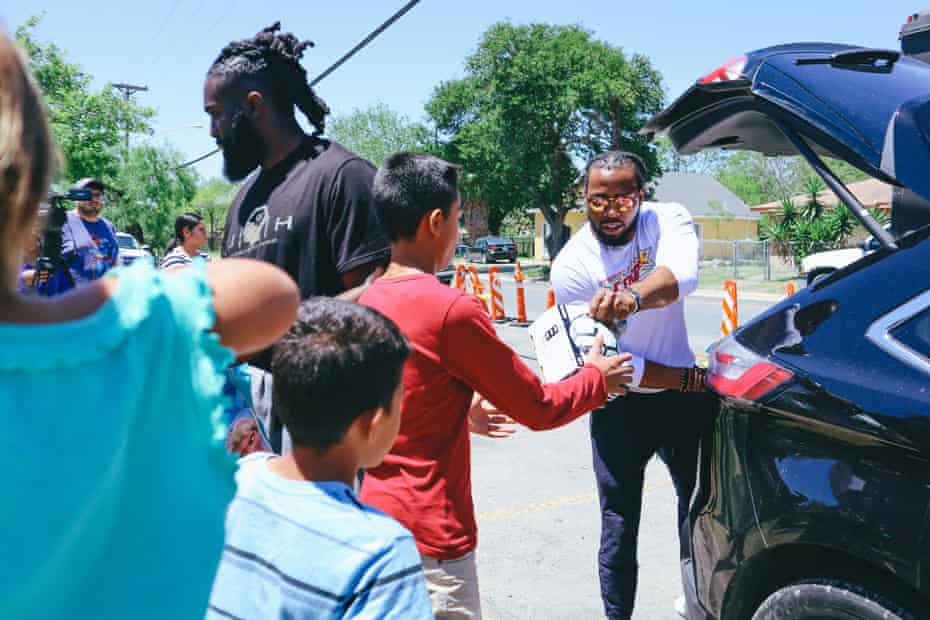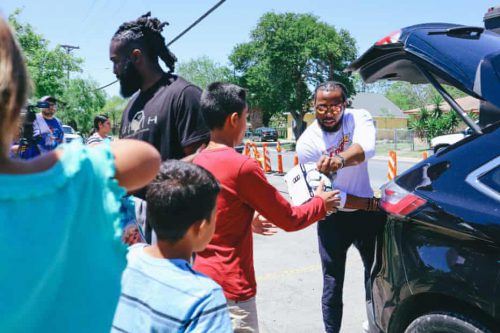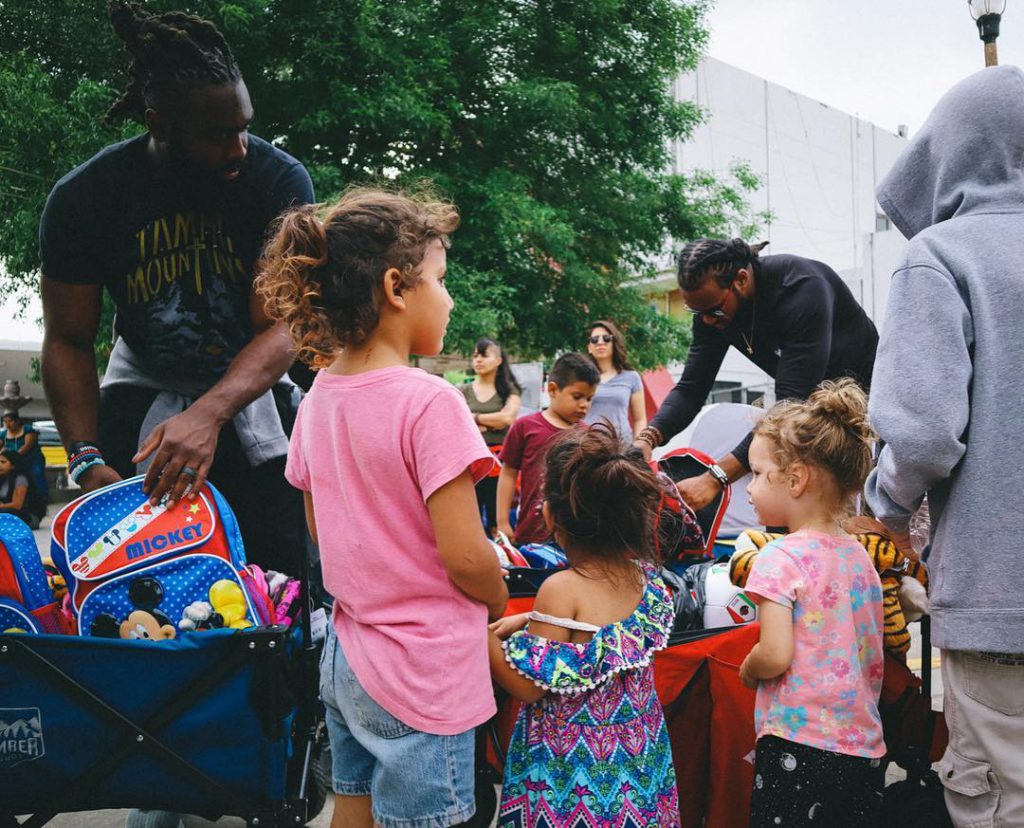You might think the high-stakes, white-knuckle lifestyle of an NFL defensive back would generate enough adrenaline to satisfy even the most voracious thrill-seeker. Not for Josh Norman, the nine-year veteran who has been known to spend his offseasons in pursuit of the next ultimate high: whether it’s jumping out of planes, flying with the US Navy’s Blue Angels, driving stock cars at Charlotte Motor Speedway or running with the bulls in Pamplona.
The 33-year-old cornerback took the long road to NFL stardom, going from a walk-on at Coastal Carolina University after receiving no scholarship offers out of high school to the All-Pro first team with the Carolina Panthers during their charmed Super Bowl season in 2015. His yen for new experiences is matched only by a dogged commitment to giving back through Starz24, the 501(c)(3) nonprofit foundation he launched as a rookie, which to date has donated more than $3.4m to youth organizations and nonprofits.
Last month, Norman realized a dream nearly a decade in the making when he partnered with the Boys & Girls Club to open the Starz24 Teen Center in the South Carolina town of Greenwood where he grew up. Norman spoke with the Guardian about his passion for uplifting the marginalized, why Trump fueled the rise of athlete activism and how he ended up at Anfield for that Liverpool-Barcelona match.
When you look back at the rise in athlete activism since you came into the NFL, how much do you believe it had to do with Colin Kaepernick’s decision to take a knee? Or do you think it was something brewing up in the culture that would have happened regardless?
It was definitely brewing. The kneeling just generated so much attention because of what it was against. Certain people thought it was about the flag and they couldn’t get past that because they couldn’t see the other side. It was not about the flag. The thing is, those people only saw the disrespect they wanted to see. You had people that was in the military and it was a hard stop: don’t do that, don’t disrespect the flag in your country and all that other stuff. But how else to get notoriety to a situation that went unnoticed? If you sit back and think about it, it was a brilliant ploy, knowing the fact that it started a conversation.
That’s the only thing you need, is a flame, for a conversation. Because like anything, the only thing it needs is that first light. And when you stand back, you see all it’s done is pull back layers on people. You look at Trump, most of his presidency was dealing with that. The crazy part about it is you saw people’s true colors. I feel like he was giving a pass to where it was OK for some people that were in-the-closet racists to come out.
Back in 2018, NFL commissioner Roger Goodell effectively gave in to Trump by not supporting the players’ right to peacefully protest. Fast-forward to last summer and Goodell admitted the NFL was wrong to not back the players. What do you think changed in those two years?
We’re starting to see people get on that other side. They’ve started to see things how they actually are. The wake of George Floyd, Breonna Taylor and the strings of killings that happened: that really shook the nation. Not even the nation, the world. There’s no other way to say it but 2020 was an awakening for the Black community. 2020 changed a lot of things in ways that aren’t going back anymore.
It’s been almost 100 years since the race riots and the massacre that took place over there in Tulsa, Oklahoma. But I didn’t even know about it until last year. It’s not even being talked about in history classes. Why am I learning about Edgar Allen Poe and Napoleon? Why am I not learning about my own history? We need to be honest with ourselves and the history that we live in.
With American history, they only teach what they want to teach. They don’t teach the real truth. They teach what they want and then we have to pass those curriculums to go through to the next level. So it’s like you’ve already become a part of the system. Education reform needs to take place, but it’s hard to do that because the power players are in the education.
You were among the early members of the Players Coalition, the group that formed in the wake of the first NFL protests to address inequity and social injustice. How do you think the work has gone now that it’s not in the headlines as much as it once was?
Well, it evolved. We weren’t founders of that joint, but we were on that call when everything was going on and we branched off into making it what it is. It took off into a different place and space and I was just one of those ushers that was holding the door and closing the door. Really the power players were Malcolm (Butler) and Anquan Boldin. Those guys were the founding members. We were all originally in the conversation of what we was going to do and how we wanted to move and Kaepernick was part of that conversation, too.
But (Kaepernick and Eric Reid) didn’t choose to go that route so the group went Anquan and Malcolm’s route. They brought on players from MLB, MLS, the WNBA and the NBA. It became something more than just the NFL. It bridged across avenues of players and it started a voice of advocacy for the little guy on that totem pole.
But I know I must do my father’s will for our place. You’ve got to take care of your home first. I’m just a doorkeeper, man,
It sounds like you get more satisfaction from more hands-on, direct projects rather than working within large groups.
I would say I’m a chief philanthropist and a part-time activist. I have two hats so I can pretty much play along both the lines. I’m all for the servitude of others where I can place myself at to do that. Each one, teach one. It’s kind of crazy because I don’t go out looking for these things, they just come.
You’ve donated your time and money to causes all over the map. How do you choose your projects? For example, I know you made a couple of visits to migrant children at a detention center in McAllen, Texas.
Honestly, these projects are God-led projects. It’s never my doing, it’s always something where I led to be moved in. All hands off, honestly. I was led to go to McAllen and to go over to the border of Mexico to these immigrants that were helpless and that were struggling. We saw (the reports that more than 2,000 children had been separated from their parents) on TV and you hear about all these things that people saying on these message boards and saying like, “Oh my gosh, what can I do? What can I do?” But then actually seeing it for yourself, being on the grounds where it’s actually happening, it’s a whole different thing.
How much time did you spend there?
The first day on the Mexican side we went solo just to check it out and the second day we had a guide who was able to help us in some areas. They had to be careful because they live over there and people just … You know how you think you mean well but when outsiders come in, they’re like, “Oh, all right, he’s a snitch”, or, “Is he for the people or not?” So we had to come over there in a peaceful manner, showing that we were there to give.
We bought out a whole store almost for all the people that was there sleeping outside, trying to get over. Blankets, coats, sweaters. We had it buffet-style out there for them, book bags and stuff for the kids and soccer balls and things that would make their day. Being out there in the struggle, experiencing all they had to deal with was wild.
It’s more graphic when you actually go and see for yourself. You feel like you want to be attached, you want to be there. I know there’s stuff still going on there now but I have a plan where I want to be able to help that.

We’ve been talking with the city council of Troy (about 20mi from Greenwood) because they have all this land and my whole idea was to buy out the land and then put some trailers out there, have a little park and have some of those immigrants be able to come there and then make themselves a real life living. Find work, find things to be able to help with to work on getting your visa, work on getting your citizenship form that space. Because I feel like they already are here, it’s just how they want to get working and how they want to be active. They just want a nice, clean life. Over there in Mexico, it’s cartel central. Kids get abducted, there’s so many different gang-related activities; like it’s automatic when you turn a certain age, you’re in the gang.
Who want to live like that? Therefore, families want to get out. They send their kids to try to just get out of it and the closest place they can go is the States. They say you can make it in New York, you can make it anywhere? No, you make it across that border to get into the States, you can make it anywhere. Because that’s hard, hard living over there.
Read More:
https://www.theguardian.com/sport/2021/mar/24/josh-norman-charity-activism-philanthropy

